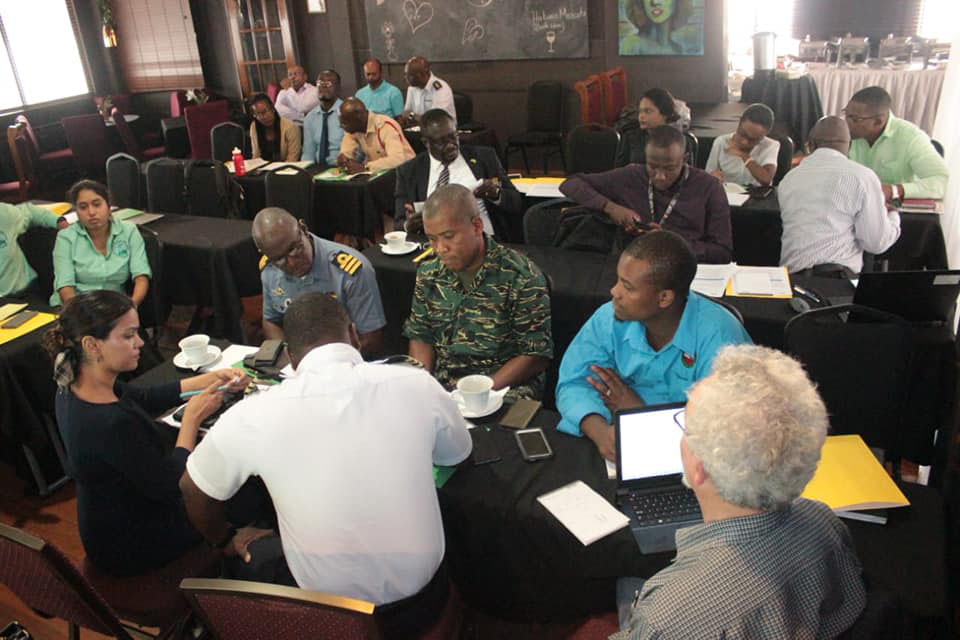A second workshop on Oil Spill Planning and Readi-ness Assessment began on Wednesday as the Civil Defence Commission (CDC) works to finalise contingency planning and it announced that a draft disaster risk management bill is to be released this week.
According to a press release from the Ministry of the Presidency, the workshop was opened for key public and private sector players in the local oil and gas sector, following a recommendation from the first workshop in March. It had been recommended that there be another session to finalise the assessment of the national readiness for oil spills before implementation can begin.
The first workshop, which was held at the Arthur Chung Convention Centre, provided stakeholders with a detailed understanding of the National Oil Spill Response Contingency Plan, as well as the requirements, policy and procedures for implementation of a national oil spill response.
The ongoing workshop facilitates input from stakeholders representing the Guyana Energy Agency (GEA), Protected Areas Commission, Guyana Marine Conservation Society, Guyana Wildlife Conservation and Management Commission, Mari-time Administration Department (MARAD), Guyana Defence Force (GDF), the Guyana Coast Guard, the Guyana Civil Aviation Authority (GCAA), the Aircraft Owners’ Association, and the Guyana Red Cross Society.
According to the release, Director General of the CDC, Colonel Kester Craig, said the workshop was organised to complete the assessment so that systematic gaps, lead agencies and deadlines can be identified and established.
It said that he also noted that the CDC is aiming to create a sustainable disaster risk management system, given that as Guyana continues to advance towards becoming an oil producing nation, the probability of oil spills will be increased significantly.
“We are here today, to take steps to formally develop a national mechanism for oil spill preparedness and response. Over the last couple of months, a number of steps were taken in advancing the oil spill response mechanism. Primarily at the legislative level, the Department of Energy (DoE) is working with the relevant stakeholders, international bodies and countries to devise and develop new legislation for Oil Spill response. At the CDC, we are currently developing a Disaster Risk Management Bill and we are ensuring that provisions are also made for Oil Spill response and preparedness,” Craig said.
The release also related that Craig noted that the Bill is currently being drafted by international experts and sometime this week it will be made available on the CDC’s website and sent to all stakeholders to peruse and make recommendations for its enhancement and improvement.
“It is our hope that we can have this Bill ready by the end of this year. Apart from the Bill, what you would find happening is that the Working Group for Oil Spill Response continues to meet every week to further develop the Oil Spill Response Plan. We have drafted a general aspect of that plan, which covers the competent national authority, the CDC, outlines roles and responsibilities, and so forth. As it relates to the roles and responsibilities, we have identified who are responsible for detection and monitoring; what and who is responsible for reporting, assessments and response. We are hoping to have a good draft of this by June 30, 2019,” the statement quoted Craig saying.
Craig added that apart from planning, the CDC is also working to acquire resources to ensure that all the key agencies are equipped to deal with any adverse effects of the oil sector.
“Right now, there are four containers of oil spill resources that has been procured by the DoE and which will be handed over to the CDC. It is our intention to take these and hand it over to the necessary agencies. We are also trying to procure other materials and very soon, the CDC would be meeting with key agencies to see what are some of the resources that they require because we are not just buying materials; we are buying what is most needed,” Craig added.






